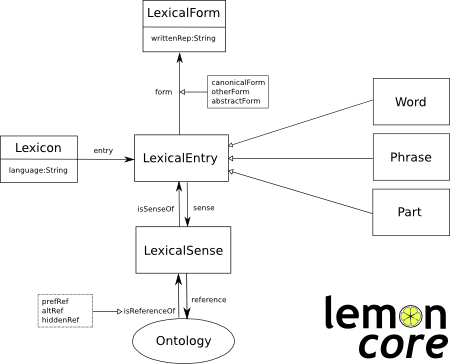lemon Model
Jump to navigation
Jump to search
A lemon Model is an RDF model for representing lexical records relative to ontology records.
- …
- Counter-Example(s):
- See: Lexical Database, Data Model, Lexicalized Ontology, Turtle RDF Syntax, ontolex, Lexical Record, Lexical Sense, lime Language.
References
2016
- http://lemon-model.net/
- QUOTE: Lemon is a proposed model for modeling lexicon and machine-readable dictionaries and linked to the Semantic Web and the Linked Data cloud. It was designed to meet the following challenges:
- RDF-native form to enable leverage of existing Semantic Web technologies (SPARQL, OWL, RIF etc.).
- Linguistically sound structure based on LMF to enable conversion to existing offline formats.
- Separation of the lexicon and ontology layers, to ensure compatability with existing OWL models.
- Linking to data categories, in order to allow for arbitrarily complex linguistic description. In particular the LexInfo vocabulary is aligned to lemon and ISOcat.
- A small model using the principle of least power - the less expressive the language, the more reusable the data.

- QUOTE: Lemon is a proposed model for modeling lexicon and machine-readable dictionaries and linked to the Semantic Web and the Linked Data cloud. It was designed to meet the following challenges:
- http://lemon-model.net/learn/5mins.html
- QUOTE: Lemon is an RDF model for representing lexical information relative to ontologies. We assume that you are familiar with RDF and Turtle, if not consider reading the tutorial here. Note, that we will use Turtle for this tutorial, however Lemon can also be serialized in any RDF format, such as RDF/XML
2011
- (McCrae et al., 2011) ⇒ John McCrae, Dennis Spohr, and Philipp Cimiano. (2011). “Linking Lexical Resources and Ontologies on the Semantic Web with Lemon.” In: Proceedings of the 8th extended semantic web conference on The semantic web: research and applications - Volume Part I. ISBN:978-3-642-21033-4
- QUOTE: We present a model we call lemon (Lexicon Model for Ontologies) that supports the sharing of terminological and lexicon resources on the Semantic Web as well as their linking to the existing semantic representations provided by ontologies. We demonstrate that lemon can succinctly represent existing lexical resources and in combination with standard NLP tools we can easily generate new lexica for domain ontologies according to the lemon model.